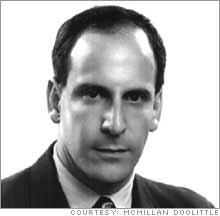|
The next hot retailers?
Industry watchers discuss five buzzworthy concepts that may be worthy of hitting Wall Street.
NEW YORK (CNNMoney.com) - A furniture company, a value-priced collegiate clothier and a fast-food chain that's popular for its ButterBurgers are on a short list of hot retail concepts that observers say could soon make a run on Wall Street. Neil Stern, retail analyst and senior partner with Chicago-based retail consultancy McMillan/Doolittle, specializes in identifying and developing new retail concepts.
Stern made the right call on retail chain Build-A-Bear Workshop (Research) six years ago when he identified it as "one of the best executed retail concepts in many years." "The attention to detail and to the target customer is absolutely brilliant," he wrote in a note back in 2000. "For those not familiar with the concept, it is targeted to young children and allows them to create their own stuffed teddy bear." St. Louis-based Build-A-Bear went public in November 2004. Its stock, which trades on the New York Stock Exchange, is up about 46 percent from its IPO offer price of $20 a share. "Generally investors like a company with a $1 billion potential. So typically they favor retailers that cater to a more mainstream market," Stern said. However, Stern's picks of the "next generation" of retail concepts are more niche-market oriented. "These companies don't exactly pose a direct challenge to Wal-Mart, but they do have their own cachet," he said. Stern employs three criteria to evaluate a realistic retail IPO candidate. "In general, if the company has $100 million in annual sales, then that suggests the concept has some substance to it," he said. The other markers are sustainable growth patterns, "usually between 15 to 20 percent historically," he said, and the overall profitability of the business. Based on those guidelines, here are some of the new players that Stern thinks are getting warmer to a public debut: -- Ashley Furniture Industries: The Arcadia, Wis.-based company operates about 100 Ashley Furniture HomeStores selling its own branded furniture. The manufacturing arm -- Ashley Furniture -- makes and imports furniture and bedding that are sold through other retail outlets as well. "What's unique about this company is that it's vertically integrated by virtue of being both a furniture manufacturer and a retailer," said Stern "Ashley's been growing very aggressively at about 40 percent a year and it's one of the largest furniture retailers in the U.S. market," he added. George Whalin, an independent retail consultant, said Ashley was quick to jump on the opportunity of manufacturing furniture inexpensively in China through joint ventures with local companies. "This has allowed them to maintain their costs and become the leader in low-priced furniture," he said. The company was not immediately available for comment on its annual sales. --The Fresh Market: The Greensboro, N.C.-based gourmet grocer operates about 50 stores, primarily in the South and Southeast, selling a selection of organic, gluten-free and transfat-free fruits, vegetables and other food products. "This company is expanding into new markets in the Midwest," said Stern. "Success begets success. So people look at how well Whole Foods (Research) has done and think this bodes well for other niche players like Fresh Market." The company was not immediately available for comment on its annual sales. --Steve and Barry's: The New York-based company began in 1985 by opening primarily in university towns to sell licensed collegiate merchandise. Now, Steve & Barry's has become one of America's fastest-growing national mall-based concepts, Stern said, doubling in size in both 2003 and 2004. While its stores are getting bigger, averaging about 100,000 square feet, the retailer has managed to expand its customer base beyond the student community to entire families by selling clothing items like caps, shirts, shoes or jackets at relatively low prices. "The company's been expanding its store sizes and now it's become a replacement anchor for many of the troubled and shuttered mall anchor department stores," Stern said. "As a family store, I think Steve & Barry is a viable competitor to Old Navy." "Steve and Barry's is really onto something with their model of inexpensive sports clothing," said Whalin. "I don't think there's anything in their stores for over $20." The company does not disclose its annual sales. --Culver's:This Wisconsin-based fast-food chain is best known for its two signature menu items: Butterburgers, or hamburgers served on toasted buttered buns, and its frozen custard dessert. Stern said he likes Culver's because it offers a family-friendly ambience similar to McDonald's with "good quality" food. "The company operates about 300 locations, with a big cluster in the midwest region," he said. "It is aggressively expanding to other regions through its franchising model." Culver's was not immediately available for comment on the company's annual sales. However, market research firm Technomic estimated that the company's U.S. sales crossed $400 million in 2004, the latest data available. --Metropark: Hot Topic founder Orv Madden is the creator behind this California-based retail startup. Unlike Hot Topic, mall-based Metropark stores aren't targeting fickle teen shoppers. Said Stern, "This store is for customers who have moved beyond a Hot Topic. They're older and more mature, in the 25-to-34 age range." Even though he's closely tracking Metropark's expansion, Stern thinks the company is still about a year away from a potential IPO. Metropark could not immediately be reached for comment. ---------------------------- Retailers saw a strong end to the holiday shopping season. Click here for more.
Retailers are already selling spring clothes in January to try to boost gift card-driven post-holiday profits. Click here for more. |
|

